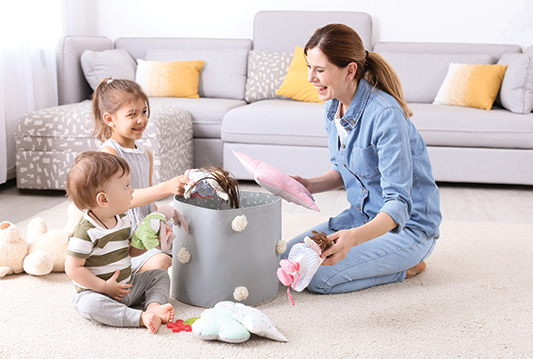By Sandra Bolan
Most parents have one main goal as they raise their children: to create responsible adults.
That’s a pretty broad expectation, but being responsible essentially means being dependable, accepting credit when due and criticism when warranted, as well as being a contributing member of society.
Some parents confuse responsible with obedient. However, those are two very different ideas. An obedient child will follow parental instruction without question, much like a puppy. On the other hand, a responsible child will put the dishes away or clean up her room because it’s something that needs to be done, and when family chores are divided up, those were hers.
At What Age Should You Start?
Responsibilities need to be age appropriate. Toddlers can do simple things such as putting their toys away after playing with them. Tweens can do their laundry.
Chores need to be explained. In detailing your expectations, it’s best to show them how to complete it. Parents also need to clearly lay out the consequences for not completing the task.

Even though you showed your child how to complete various tasks – to your specifications – allow her to do them her own way. For example, let your children fold their laundry how they want to, which may not be as neat and tidy as if you did it.
Allow your children to make mistakes – and they will. Just don’t overreact. Turn mistakes into teachable moments – what went wrong and how to correct the mistake next time. Children need to take ownership of any mess-ups and the resulting consequences.
Create a Chore Chart
One way to organize a family’s responsibilities is to lay them out on a chart everyone can see. Mom and Dad also need to be included on the list. The division of gross chores, such as cleaning toilets, shouldn’t fall to the same person every week.
Every family member needs to take their turn doing the yucky stuff. It’s also a great reminder to us adults and a lesson to children that, in life, there will be times when we’re going to have to do things we don’t like.
We all want to be appreciated for a job well done, but it’s important to not reward children for every little thing they do.
For example, you have to harp on your little girl to put all of her toys away, as per the chore chart. She finally does it. You then take her out for ice cream as a reward. That’s more like a bribe than a reward.
There are many chore charts available online, but the format is basically the same. For every chore completed, the person gets a check mark. Once all of the chores are complete, then she gets a pre-determined reward.
Just as rewards are pre-determined, so too should be the consequences of not completing tasks. Part of becoming a responsible child, then adult, is understanding there will be consequences for a job not done.
Be a Role Model
When you make a mistake, own up to it, then correct it. Don’t complain about your chores, or even your job. Take pride in what you do – inside and outside the home.
Don’t forget to tell your child “well done.” There’s nothing like positive reinforcement from a parent. Sometimes it’s even more meaningful than a gold star on the chore board.
If you want adults who are responsible and contributing members of society, remember that giving your children chores isn’t mean – it’s essential.




